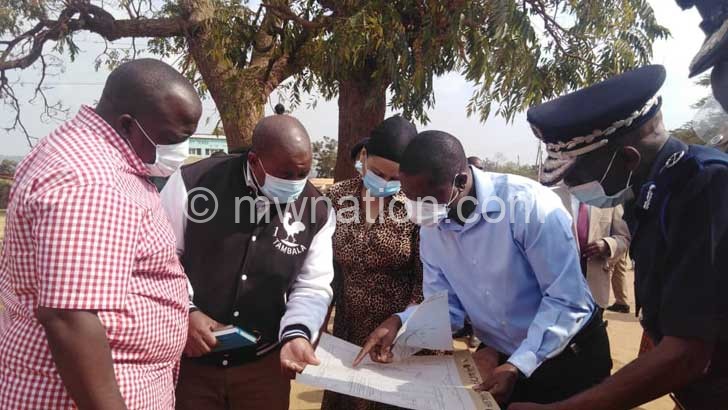Taxpayer set up In land deal
Lands Minister Kezzie Msukwa could potentially be setting up the taxpayer for an expensive legal battle by reversing a legally binding agreement between an investor and the Malawi Government for development of police infrastructure.
The infrastructure—to be built by contractor World Wide Construction Limited—includes 140 new police staff houses and an office complex with 24 offices at Area 30 in three phases.
Phase one requires that the contractor builds 140 three bed-roomed houses, office blocks, an armoury, a shooting range, a garage plus inspection pit, parade and football grounds and a multipurpose hall at various locations.

Phase two of the deal also includes construction of an additional 160 three-bed-roomed residential houses at the National Police headquarters, Area 30, in Lilongwe.
For first phase, the contractor was not paid in cash for the construction and services to replace the existing infrastructure.
Instead, World Wide Construction was offered the current premises in Lilongwe’s Area 2 where the Malawi Police Service (MPS) C Division is accommodated in a deal made in in May 2019.
Reads the agreement in part: “Whereas the owner [government] desires to relocate the C Division of the Malawi Police Service to other locations conducive for the accommodation and location of such an important Division of the Malawi Police Service, including Area 30, Area 6, Area 47 and Area 2 in the city of Lilongwe.”
The agreement states that the contractor pays the duly assessed premium for the current location—Plot Number 2/017 and 2/683, all land in total comprising 20.174 hectares—after an independent evaluation.
Phase three entails construction of desegregated hostels for up to 150 males and 150 females that will accommodate up to eight persons per room with parking for four armoured vehicles at Area 6 in Lilongwe.
Under this arrangement, the contractor is responsible for the design, procurement and construction of the three-packaged project.
In a telephone interview yesterday, Msukwa said the review is only for the first phase of the contract, which mainly centres on construction of various police houses and other facilities.
Msukwa said the ministry does not have a problem with the second phase which is already in progress.
Architects for the project, IM design say excavations and earth works have already commenced at Area 30 while at Area 6, work will await the handover of the land after completion of the transfer of the prison to the newly built Prison in Chitedze.
Wadi & Associates, lawyers for the project who are specialist Attorneys in Construction Contracts and Land Law confirmed that negotiations took very long to ensure compliance with all legal requirements as well as standards and specifications of the buildings. The Attorneys also mentioned that the “construction in exchange of land project” involved an aspect of public disposal and Section 38(2) (c) of Public Procurement and Disposal of Assets Act was duly complied.
The discussions took long as it involved various stakeholders and discussed at length as to the requirements of MPS, what was expected to be built and the architect and engineers had to translate that into drawings with standards and specifications which again had to be vetted by all the Parties. The entire process was vigorous and conducted in an open and transparent manner. Technocrats and professionals were given oportunity to give their input. Three lawyers, two of whom were from MPS, translated the issues into an MOU and an agreement which was also fine-tuned by the Ministry of Justice.
Mike Banda, a resident of Lilongwe, stated that the current location of PMF staff Houses at Area 2 is unsuitable as the area has been taken up by commercial developments which have rapidly expanded over the last 10 years.
In an earlier interview, property management expert Sausten Kabichi stated that paving way of the institutional land for commercial development will spearhead the modernisation of Area 2 commercial centre commonly known as Bwalolanjobvu.
He stated that the new developments will also support the existing hotel infrastructure —Simama Hotel. He added that this is the entry point to Lilongwe through Kamuzu Processing Road and the existing buildings do not give a good impression to visitors.
Again, noise and air pollution in the area is very high and as such it is not suitable for residential use.
Bwalolanjobvu commercial hub was founded in 1934 by small traders and grew rapidly thereafter after Southern bottlers and Chunara High Way opened their outlets in the Area. Before the 1934, the area was a home of herds of elephants, hence it was known as Bwalolanjobvu.
In a separate interview yesterday, Human Rights Defenders Coalition (HRDC) chairperson Gift Trapence said the best way government can deal with land issues is through a fair and comprehensive land audit. A





